Since my last post was about my uncle, the guitarist David Vernon Kumar, it seemed appropriate to devote this post to one of the films for which he played. Mahal, made when my uncle was about 20 years old, featured the hauntingly melodious Aayega aanewaala, the song that shot Lata Mangeshkar into the limelight – also a song, which, if you listen carefully, has some beautiful guitar notes. Played by my Vernie tau.
Mahal is an odd film. I first watched it when I was a child, and didn’t quite understand all of it. This time, when I rewatched it, I found myself wondering what possible genre it could be classified under (not that too many old Hindi films can be grouped under any one genre; nearly all are musical and romance, plus something else – suspense? Social issues? Fantasy? All of the above?) Mahal is a bit of everything, too. And yet, strangely mesmerising.
It begins on (what else?) a dark and stormy night. Shankar (Ashok Kumar) is the son of a judge who lives in Kanpur and has recently bought a large mansion, called Sangam Bhavan, near Allahabad. Shankar has come to see Sangam Bhavan for himself, and is surprised to discover that the only servant around in this vast echoing house is a gardener, Krishna (?).
Krishna leads Shankar into the house, and tells him a little bit about Sangam Bhavan’s history. The house stands on the bank of the Yamuna, and had been built about 40 years earlier by an unknown man who would come every night in a boat to supervise the construction. When Sangam Bhavan was ready, the man brought his beloved here – a very beautiful woman named Kamini – and she began living in Sangam Bhavan. Every night her lover would come, rowing across the Yamuna, to her.
One night, though, during a terrible storm (such as this, says Krishna, indicating the storm raging outside), the boat capsized in the Yamuna and the man drowned. Kamini, grief-stricken, did not last long; soon she too threw herself into the river and drowned.
Since then, says Krishna, Sangam Bhavan has been haunted by the memories of those two lovers who were separated by the elements.
This sad romance intrigues Shankar, but not much. He requests a favour from Krishna; will Krishna please go – now, in this thunderstorm – to Allahabad? Shankar gives the gardener the name and address of a friend named Srinath, who is a lawyer. Krishna is to tell Srinath that his old friend Shankar has arrived at Sangam Bhavan.
Krishna goes off, and Shankar, wandering through the house, has a narrow escape when an old portrait falls off a wall, nearly hitting him in the process.
If that wasn’t eerie enough in itself, this is what Shankar sees when he has a closer look at the man painted on the canvas:
Somewhere in the vicinity, a clock strikes two… and, as if on cue, somewhere nearby, a woman begins to sing.
Shankar follows the voice, trying to find the singer, but she’s elusive beyond belief. One moment, he glimpses her – her face too far away to be seen – as she sits on a swing and goes to and fro, to and fro… but when Shankar hurries forward, it’s to find an empty swing.
A black cat runs past, crossing Shankar’s path, and he continues to hear that mysterious woman singing, now as she rows a boat on the river. Who is she? He does finally manage to see her face – as he glances in through the carved panel of a door – but the woman (Madhubala) quickly veils herself. By the time Shankar rushes into the room, it’s empty. She’s vanished again.
Just then, Shankar’s friend Srinath (Kanu Roy) arrives. Shankar repeats the old story that Krishna had told him, shows Srinath the portrait, and tells him about the elusive singer. Srinath is inclined to put it down to Shankar’s imagination, but Shankar is by now pretty convinced that he is the reincarnation of the man who had built Sangam Bhavan. Surely he has been reborn so that he might be reunited in this life with his age-old beloved, Kamini.
And so we go on: Shankar keeps seeing ‘Kamini’ – she even has a brief, rather vague conversation with him in which she alludes to how long she’s been waiting for him. Shankar’s belief that this is a spirit, not a flesh-and-blood woman, is strengthened by the fact that her favourite spot seems to be an old riverside gazebo, from which she always vanishes – either by jumping off into the river below, or by stepping off – but where?
Shankar’s swiftly becoming obsessed with ‘Kamini’. Two o’clock every night finds him beginning to hear her song, echoing in his head.
Srinath, good friend that he is, cannot see his pal going to pieces in this ridiculous fashion. He therefore tries to distract Shankar by sending him off (on a wild goose chase) to two dancing girls. (One of whom is played by Sheela Naik, who acted the part of Nadira’s maid in Aan).
It doesn’t work, though – Shankar leaves the two dancing girls to their own devices at 2 AM, and goes off again to Sangam Bhavan, pulled by that invisible string that is Kamini…
This time, as she leads him through a hidden passage linking the mansion to the river, she tells him all. He is the reincarnation of the man who had built Sangam Bhavan. And she, Kamini, is the spirit of his poor lost love. Kamini explains that they can never be united in this life, because he, having died a violent death by drowning, has been reincarnated, while she – because she committed suicide – is doomed to remain a spirit, and not be reincarnated.
Shankar is terribly distressed at this revelation. But Kamini holds out one hope: she can occupy the body of another woman, drive out the other woman’s spirit – kill her, in other words – and then they will be united. Because the other woman’s spirit will be Kamini’s.
But will Shankar approve of the other woman’s face and body? Perhaps he should say yes only after he’s seen a woman whose face he likes – after all, they will have to spend the rest of eternity together.
Shankar, thoroughly taken in by now, agrees to whatever Kamini has to suggest.
She has an odd suggestion to make. The gardener Krishna has a daughter named Asha – Shankar has noticed her before, going about her chores, her face hidden in a heavy opaque ghoonghat. Well, the next morning, when Asha brings him his tea-tray, Shankar should lift her ghoonghat and have a look at Asha. If he likes what he sees, Kamini will kill Asha and occupy her body.
They will then live happily ever after.
That does not happen, though.
The next morning, just as Shankar is moving forward to unveil the gardener’s daughter, Srinath – who’s been worrying himself sick over his friend’s lunacy – comes rushing in, bringing with him Shankar’s enraged father (M Kumar). Shankar, adamant on not leaving Sangam Bhavan, runs, falls down a flight of stairs, and is taken, alive but injured, back to Kanpur.
This is all sheer madness, says Shankar’s father; if Shankar has any sense whatsoever, or any idea of honour and family duty, he’ll forget this silly notion of reincarnation and eternal love.
What’s more, as Shankar himself is well aware, he is already engaged – engaged to a well-brought up girl from a ‘good family’ (even though Shankar has never seen the girl). Shankar cannot jilt her; he must marry his fiancée as soon as possible.
Much emotional blackmail ensues, and Shankar gives in. (His way of giving in is dramatic: his father hands him a loaded pistol, telling Shankar that if Shankar will not agree to get married, he may as well shoot his father right now. Shankar shoots – sending four bullets, one after the other – but not at his father. Instead, he shoots at one of his own portraits, which hangs on the wall behind. The bullets rip through the chest of the painted Shankar. A symbolic suicide).
Shankar, therefore, marries his fiancée, Ranjana (Vijaylaxmi). He marries her, sight unseen, but tries to come to terms with his new life that night. When he enters the bridal chamber, he tells the still-veiled Ranjana that he has great hopes of their future together. He seems shy, happy – when she reaches across and removes a rose from his buttonhole, he even holds her hand, admiring its beauty and delicateness.
It seems Ranjana – even a veiled Ranjana whose face her husband has not yet seen – has already been able to banish the mysterious Kamini from Shankar’s thoughts. But just as Shankar reaches forward to lift Kamini’s ghoonghat, the clock strikes 2, and Shankar hears that lovely voice calling…
… and he rushes off, hurrying through the house in confusion, trying to get back to Sangam Bhavan and Kamini. He is jerked out of his stupor when he bangs into a hanging birdcage and ends up coming to his senses.
But Shankar, even a Shankar who realises deep down that he is now married and must be faithful to Ranjana, cannot forget Kamini.
So Shankar does the only thing he can think of: he runs away. He takes Ranjana – still veiled, still unseen by her own husband, still with her marriage unconsummated – with him. He takes her deep into the mountains and far away from civilisation, to a place where he hopes he will be untroubled by the spirit of Kamini. This is an awful place, wild and inhospitable, and Ranjana is miserable. Not just because she is far away from her family and friends, but more because her husband has still not bothered to even see her face. “And I will not lift my ghoonghat on my own”, she writes in a letter to her bhabhi.
On the one hand, Ranjana vows to herself that she will find out what terrible secret Shankar is hiding from her – why is he so agitated? What comes between the two of them? On the other hand, Shankar, though far away (geographically) from Sangam Bhavan and Kamini, is unable to shake off his memories of her.
Where will this all lead to? Will Ranjana realise what is happening? Will she find happiness with Shankar? Or will Shankar return to Kamini – his ‘eternal love’? And what, anyway, is happening?
As I said, I found this a somewhat odd film. On the surface, the story appears to be what became in the 60s a popular theme for suspense films: a man falls in love with a woman who appears to be a spirit (I’m thinking Woh Kaun Thi?, Anita, and Yeh Raat Phir Na Aayegi – the last-named, by the way, actually contains words from the lyrics of a Mahal song). But is this really a case of the supernatural?
What I liked about this film:
The music, of course. Aayega aanewaala, besides the fact that my uncle had a hand in the playing of it, is one of my favourite Lata Mangeshkar songs – it’s beautifully sung, the music (by Khemchand Prakash) is wonderful, and the overall effect always gives me gooseflesh. Mahal also has some other great songs: Mushkil hai bahut mushkil chaahat ka bhula dena, Yeh raat phir na aayegi and Main woh dulhan raas jise na aaya singaar are some other favourites of mine.
The cinematography, the frames, the angles, the lovely play of light and dark and all the shades between. Kamal Amrohi, the director, uses the camera in amazingly effective ways. Look at this, for instance: Madhubala’s face, just after she sees Shankar for the first time and rushes from him – but turns back, unknown to him, and watches him from behind the lattice screen of the window:
Or this scene where Krishna tells Shankar the story of Sangam Bhavan as he goes about lighting a chandelier, the light from the candles slowly increasing as his tale reaches its climax.
What I especially loved were the extreme close-ups that allowed one to really feel the emotion of a character without the actor having to resort to high histrionics. Somehow, I think the sheer despair of Ranjana, who cannot fathom why her husband rejects her so, is more obvious in this frame than if she’d been weeping her eyes out:
And Madhubala, here, looking exquisite – but with that somewhat blank look which prompts one to think: has the news she’s just heard sunk in? Is she so befuddled by the trick fate has played on her that she is incapable even of reaction? Or does she not even care anymore? Is she too numbed by all that’s happened?
What eventually did work for me was the power that Mahal manages to project. As an experience – sheer visual effect – it’s a memorable film. It may not be a great story (I thought it a little too tedious, even downright ludicrous, at times), but there are moments where it excels. In the portrayal of despair (Ranjana’s increasingly despondent letters to her bhabhi); or Shankar’s helpless frustration in realising he’s caught between filial plus marital loyalty on the one hand, and Kamini on the other; or the touching scene where Shankar, despite loving Kamini to distraction, is able to summon up the humaneness to comfort a weeping Ranjana.
Mahal was, for me, an interesting study in characters. There are very few main characters here – ultimately, it’s just a play between the emotions of Shankar, Ranjana, and Kamini. Who will win? Who will lose? But whom do we want to win, and whom to lose? Eventually, everybody is shades of grey. There are reasons for what Kamini does; there are reasons – dire, but to some extent understandable, given Ranjana’s state of mind – for what she does.
What I didn’t like:
The occasional holes in the plot. While the pieces do more or less fall into place, there are some questions left unanswered, some things skimmed over conveniently.
Minor spoilers ahead:
For example: while the mystery behind ‘Kamini’ is explained, no logical explanation is given for the fact that the original owner of Sangam Bhavan – the man who had it built – had a face that was identical to Shankar’s. And Ranjana’s fateful letter ends up in the right hands too much by coincidence, at too coincidental a time.
Spoilers end
Plus, I’m not much of a fan of the love-endures-through-many-lives trope. I find it tedious, and can’t quite reconcile with it. So, obviously, that concept didn’t sit well with me. And I couldn’t abide with the high-handed, utterly selfish way in which a lot of the characters treated one another – and, what was even more surprising, the way in which the character at the receiving end allowed such treatment. I suppose by now I should be immune to seeing filmi parents run their offspring’s lives, or husbands do just about whatever they wish without taking their wives into consideration… but the demand Shankar finally makes of Srinath? And Srinath’s response? Ugh.
Perhaps that was, after all, a reflection of what ramifications of loyalty Mahal was trying to project: that there are loyalties – to one’s family, the family’s honour, to one’s spouse, one’s friends, whatever – but it just didn’t work for me.
Still, this is a landmark film, and not to be missed. See it, if only for the stunning visuals, Madhubala’s beauty, Aayega aanewaala – and the rivetingly grim sense of fatalism that grips much of the film.
Edited to add: I’ve just been told by my father that two of the other songs from Mahal for which my uncle played the guitar were Mushkil hai bahut mushkil and Dil ne phir yaad kiya.

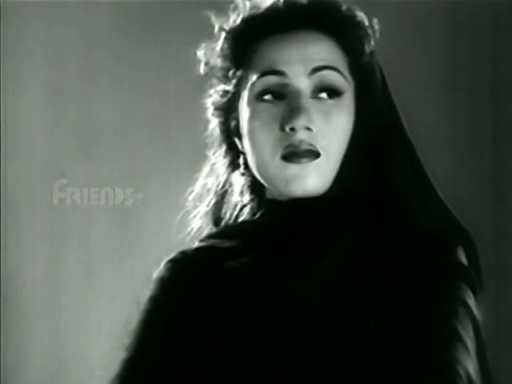







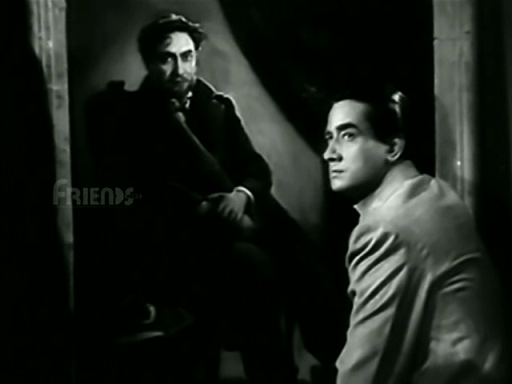


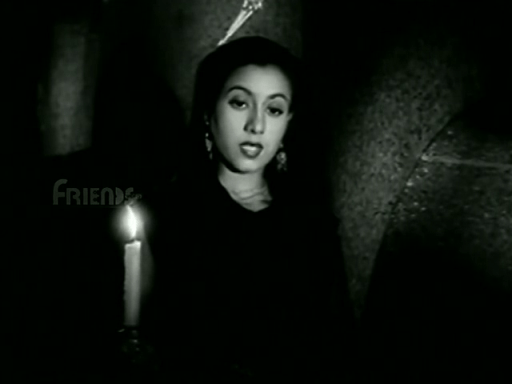


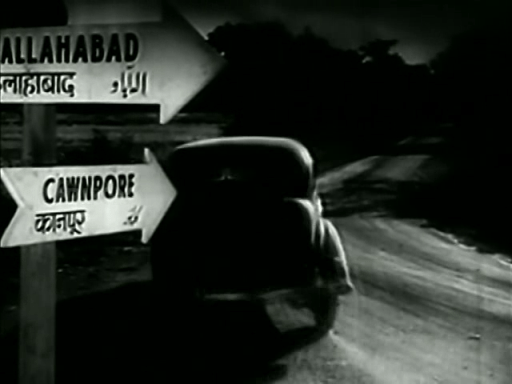


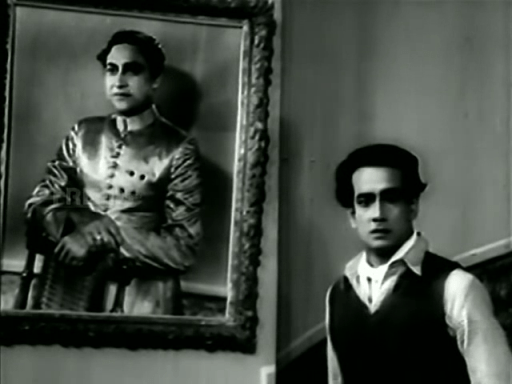
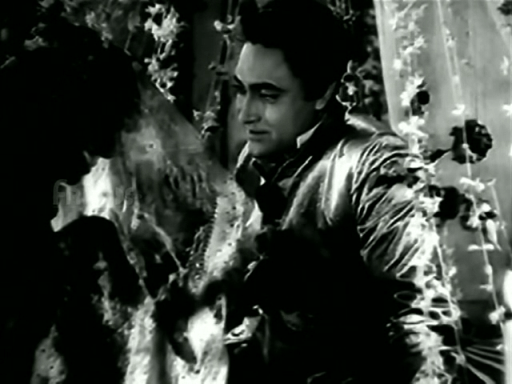
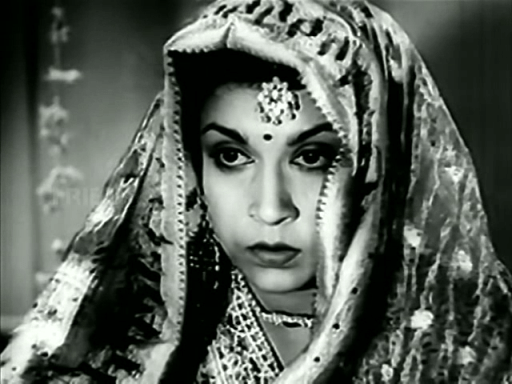
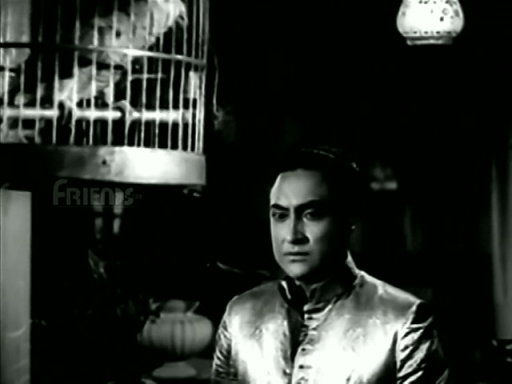




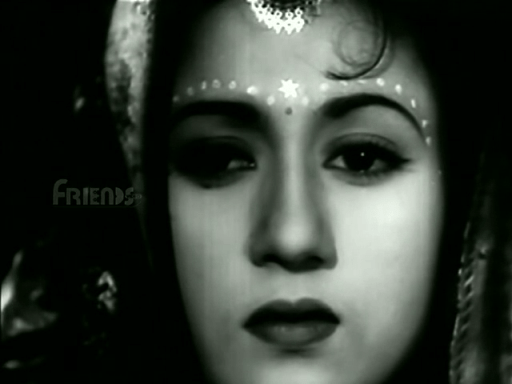

Madhu, thank heavens I was working late and saw this as soon as it was posted. :) I remember *hating* Mahal with a vim and a verve when I first saw it (I was in my mid-teens then). I really could not understand *why* every one had to behave in so nonsensical a fashion. And I positively hated Ranjana for what she did – talk about being black and white! I was going ‘How could she!’ several times during those scenes, and remember feeling *very* disgusted at the ending. I love the beginning of Aayega aanewala – I found that very haunting. But don’t you think Aaja re pardesi is a far superior song, musically?
LikeLike
Yes, the way Ranjana behaved had left me aghast too, the first time I saw Mahal. One the other hand, I’d been equally horrified by how Shankar had behaved towards Ranjana – after all, his wife – so it seemed to me to sort of balance everything. Still, I remember being very confused by it all. I guess there’s a dark, gloomy quality to it all that a pre-teen (I must’ve been about 12 when I saw this) wouldn’t have been able to fathom.
I can’t say whether I like Aayega aanewaala better, or Aaja re pardesi – I think each has its own merits. I prefer the orchestration of the latter, but Lata’s voice in the first few lines of Aayega aanewaala – that perfect control, the gooseflesh-inducing, utterly haunting character of that aalaap – is a class apart.
LikeLike
sounds so darn intriguing. I just have to see it now!! Thanks for the wonderful summary!!
LikeLike
Yup, it is sort of intriguing – but, really: watch it more for the visual power of it rather than the story. Storywise, the later Mahal is far better. :-)
LikeLike
I think of Mahal as a psychological study. As the story of an obsession it is utterly believable. IMO it’s a great film.
Madhubala is rather insipid compared to later years. Ashok Kumar is very good and so is everybody else.
LikeLike
Yes, Ashok Kumar was certainly very good, and so too was Vijaylaxmi. Madhubala may have been insipid, but then I think there are two things to be said for that… Firstly, the role was such that for much of the film, she’s this mysterious woman who speaks in riddles; she doesn’t get much chance to show too much emotion. Secondly, to compare the Madhubala of later years might be a little unfair, because the sort of roles she ended up doing later (except for a couple, like Mughal-e-Azam or Amar) were generally frothy, light-hearted stuff – not the noir type like Mahal. So, unless one evaluates her performance in Mahal against a similar role in her later career, it’s hard to judge.
But, of course, there’s the fact that this was, after all, a very young Madhubala – she was 16 years old (?). So I guess some allowance should be made for that!
LikeLike
just like you I also saw this film when I was small and didn’t understand it all and then I saaw it in my late teens again and was very much fascinated by it. Not really by the story but by the whole built-up and Amrohi’s direction.
I think I should give it a dekho again!
As for the demands made by parents on their children regarding marriage: isn’t that true for most part of india, at least at that time. And moreover if an old conservative father sees his son running after a girl, who can’t really exist, he would think it is the best for his son to do what he thinks is right for him, just like he did it for his father. A liberal one would send him to a psychatrist. And even in my generation I have seen some parents pressurising their children (boys AND girls) into marriage. A good friend of mine (he was 20 at that time) was forced into marraige with emotional black-mail that hi sister wouldn’t find a man to marry if he didn’t marry first. Poor thing was damn upset over the whole thing and I think I also wasn’t much of a support for him at that time. Wonder what happened of him! So I think the portrayal of parents blackmailing their children into marriage is a reflection of what happens in the society.
LikeLike
I agree re: the demands Indian parents make on their children. Even in real life. I know of cases too where people have been emotionally blackmailed into getting married to someone they didn’t know – though I do think the case of your friend takes the cake. Poor man; it must have been a real shock for him. :-(
The point I was particularly trying to make was that I wasn’t especially surprised by the way people like Shankar’s father – or Shankar himself, vis-a-vis Ranjana – controlled the lives of their family… those are things one is aware of, both in reality and onscreen. What did irritate me a lot was the demand Shankar makes of Srinath towards the end of the film, and the reason for it. That was awful, and it made me feel really sick.
LikeLike
“the demand Shankar makes of Srinath towards the end of the film”
Yeah, I have never been able to understand such motifs in Hindi cinema. Sorry, I misunderstood you!
LikeLike
That particular demand was so crazy! And that Srinath should agree to it… kya re.
LikeLike
BTW Madhubala just looks gorgeous here, doesn’t she?
LikeLike
Lovely! But then, I’m a out-and-out Madhubala fan, so I think she looks gorgeous just about everywhere.
LikeLike
I have never ever forgotten what a dead letter office is after seeing this movie. But seriously, what a movie.
LikeLike
Yes, that brief scene in the dead letter office was very real, wasn’t it? Somehow there was something about it that was so different from the usual Hindi film representation of offices – it just seemed as if it was true.
What a movie, indeed.
LikeLike
Another film I haven’t seen. I think it looks stunning though. I’d certainly watch it as a visual treat, with Madhubala as bonus, even though the story does sound tedious.
LikeLike
You should watch it, Banno. The story is tedious in places, but the visual impact is worth it. And there’s a sort of interesting play of emotions and characters and their relationships that could make for a rewarding bit of psychoanalysis.
LikeLike
What a wonderful review Madhulika. I read spellbound. It was better than the film!
Julia
LikeLike
Thank you, Julia! That is high praise, indeed. :-)
LikeLike
I have to second julia’s opinion. the quality of your reviews are much better than the films you review. But after reading so many of your reviews, I think, I take it sort of for granted. Thanks to Julia for reminding me of it!
LikeLike
I second Julia :)
LikeLike
I third everyone who said that. :)
LikeLike
You guys are all so sweet! You’ve just put a BIG goofy grin (Premnath style!) on my face that’s going to last for the rest of the week – at least. :-)
*hugs to all of you*
LikeLike
thanks!
LikeLike
I second those goosebumps from Aayega aanewala, such a beautiful song and I remember having even more additional respect for Lata upon watching it. I found the movie a bit slow for my taste, that being said its an still an interesting one and I agree with the case s you’ve made for seeing it. Ashok was superb here, and I love that painting of him even though it looks very eery.
LikeLike
Although Ashok Kumar didn’t often get these sort of roles (in his early movies, he’s mostly been the pretty conventional sort of hero, hasn’t he?), I think he did justice to Mahal. That piercing look in the eyes, his fascination for the mysterious Kamini… he’s very convincing. Whoever painted that picture did a good job of capturing the arresting look in his eyes.
LikeLike
Saw this for the first time a few years ago, and was surprised that a 1949 film was not only watchable but good.
The music is fantastic. I prefer Ayega aanewala to Aaja re from Madhumati.
I think there ‘was’ a time when people did things for another which would not be believable in todays kind of world.
Ithink there may also be some real historical support for this.
It all depends on ones mindset.
I remember when going around Rajasthan an American woman got into almost an argument with the guide (who was also describing culture along with facts of the buildings) about arranged marriages.
Yes, it’s a good study in psychoanalysis.
LikeLike
I guess I agree with you about that, pacifist. Look at something like those ‘snake woman’ movies like Nagin or Nagina. I mean, these were being made well into the 80s (Sridevi acted in a couple of them, didn’t she? I never saw them, though)… I think any producer who tried to make one of those films today would get laughed out of business.
LikeLike
>I think any producer who tried to make one of those films today would get laughed out of business.
*sigh* THat’s such a pity. :(
They all want wannabe films.
LikeLike
Too true! One theme that seems to be particularly popular these days is the ‘coming of age’ one, no matter at what age one realises what one’s real dreams should’ve been… whether it’s a Dil Chahta Hai (okay, that’s a while back, but still not too long ago), a Zindagi na Milegi Dobara, Rock On!, Wake up Sid or whatever. They seem to be the ones raking in lots of moolah…
Somehow, the films I’ve remembered liking in the recent past – like Lafangey Parindey or Jhootha hi Sahi – have been flops, more or less. :-(
LikeLike
Interesting review, but I doubt if I will ever get to watch the movie, unless it comes on Youtube, so I will spend the rest of my life wondering what Ranjana did to come across as disgusting!
Regarding arranged marriages, my students here always wondered how I could still be married to the man I had never met until my marriage, and their favorite questions were – But do you love the man? and, Did your father tell you to marry him or else? I always laughed and answered Yes, to the first, and No, to the second!
LikeLike
I guess some institutions more or less remain in society, even though their shape changes… I met up with a couple of old friends yesterday for lunch. Both had arranged marriages, but were allowed to meet the men before they decided they liked them and would like to get married to the man in question. One of these women even went out – every evening, I remember, after office – with the man for a good three months before they got married. So it actually ended up being a love match! :-)
On the other hand, I remember having gone to a wedding – both bride and groom were MBAs, working with MNCs – who had never even seen each other, let alone getting to know the other person. At the wedding, my mum was taken in to meet the bride, and found her crying because she didn’t know what sort of man she’d be getting… then mum learnt about what was happening. Happy end, there too, because he was a wonderful young man and they were pretty much in love by the time we met them next, but it’s scary – the girl’s father had told her, “You’ll marry this man. No question about it.”
LikeLike
I know what you mean Lalitha. My parents, uncles, aunts all had arranged marriages, and so did my brother, many cousins, and also several school friends. It’s perhaps dying out in the big cities.
I’m a supporter of both. If one is lucky enough to fall in love and find a suitable partner – very good, but for those who don’t, parents’ choice is not bad.
Coming to the film, I agree with harvey about the reasons Ashok Kumar’s father insisted in getting him married. As a parent he couldn’t accept Ashok Kumar’s weird ideas of being in love with a ghost and not getting married to the one he was engaged to and must have approved of it earlier.
LikeLike
“If one is lucky enough to fall in love and find a suitable partner – very good, but for those who don’t, parents’ choice is not bad.”
Yes, I agree – but I do think that even in the latter case, the consent of the two people who’re going to be spending the rest of their lives together is essential. It shouldn’t be an imposition.
LikeLike
This one has a really interesting plot, and Madhubala looks gorgeous (I haven’t seen any of her movies except of course Mughl-e-Azam),
Reading this post of yours has made me wanna watch Woh Kaun Thi (I already have it with me)- This movie, I cannot find online :(
And its great that you have such a great memory of your uncle’s contribution to films- aayega aanewala- superb :)
LikeLike
I think Mughal-e-Azam is perhaps one of Madhubala’s best films when it comes to showcasing her acting ability – in too many of her films, she was just relegated to being a bubbly beauty who sang and danced and charmed the hero but didn’t do too much besides. Another good film for her was Amar. And if you just want to feast your eyes on her sheer gorgeousness, try Kala Pani, Howrah Bridge, Mr & Mrs 55, Chalti ka Naam Gaadi, Boyfriend, Barsaat ki Raat, Ek Saal… no dearth of lovely Madhubala showcases there! :-)
LikeLike
I just remembered, I had heard this movie being showcased on Radio (All India Radio I guess)- they were actually screening the movie (what do you call it for radio!)- Didn’t stop to listen to it then- This was I think 3-4 years ago-
LikeLike
Screening the movie on radio? How did they manage that? That sounds intriguing – I’m curious to know how it was done. Was somebody narrating the scenes, interspersed with the actual songs and dialogues? Might have been a little difficult for a film like this, which relied very heavily on expressions, things shown rather than said.
LikeLike
Yes, many old movies are screened on All India radio- it would be just like switching off the tv screen- and keeping the DVD audio on- like listening to a movie in cinemas with black screens :) I haven’t been an audience to any such screening- for I think these can be tolerated by only those people who have seen the movie- and are just reliving old memories-
LikeLike
That might work for some of those movies which have lots of intense dialogue, I think – but not for all. Even for films that I’ve seen a number of times, I wouldn’t want to relive a memory in such a half-baked way. ;-) But it must be working for someone, somewhere, which is why they’ve adopted this style, I guess.
LikeLike
When my parents saw Mahal way back to whichever year it was it had an end very similar to Madhumati but when I saw it sometime in the seventies and later on doordarshan the end was snipped off. It is quite possible dad said, that portion of the master print may have been in a very poor condition. Dad who was a fan of Ashok Kumar even acted out the scene featuring the lead pair. Yes they were both reborn as in the case of Madhumati.
I have another memory and yes it has to do with mum. When I was watching the film mum just got this feeling—- I have no clue why— that I would be terrified of the ghost that is Kamini and she revealed the story even as I was watching the film I remember I was furious, as it is I remember finding the film a little slow and boring and with no suspense it was a flop show for me. Thereafter I never failed to remind her how she had spoiled the film for me.
LikeLike
Hmmmmm! Madhumati kind of ending, or it was Madhumati who had a ‘Mahal’ kind of ending.
That’s really a very interesting piece of information, Shilpi.
Thanks
LikeLike
Oh! To have been told the crux of the story, poor you. I can understand why you’d have been furious – I would’ve been, too. That was unfortunate.
An ending like Madhumati? That’s interesting! But you know what? I think I actually prefer it this way. There’s a sort of tragic ambiguity to it, a feel as if all those tears, those endless struggles on everybody’s part, that hatred and unhappiness – eventually came to nothing. If the ending was made into a Madhumati-like one, I’d probably have found myself feeling too bad for Ranjana. All right, what she did was awful, but I also felt a certain sympathy for her: the way her husband treated her would’ve driven any woman to madness.
LikeLike
Well pacifist is right Madhumati had a Mahal kind of ending. Madhu I am not sure whether you understood what I meant well what happens is after the end as you have seen it, the film continues there is this newly married couple getting down from the tonga right in front of this Mahal, needless to mention the newly married couple is Ashok Kumar and Madhubala in their modern avtaars, they have purchased this Mahal or something like that as they enter they are both surprised to see this painting of Ashok Kumar, I forgot what else happens but but I remember dad mimicking Ashok Kumar’s surprised and startled expression as he hears the clock strike the hour. Obviously they have both been re-born as in Madhumati to settle down to a happy life.
LikeLike
Oh, I guessed what must have happened, Shilpi, because I remember the end of Madhumati very well. My only reservations were about how that would have worked in a film like Mahal, where somehow – at least for me – the ‘love’ between Shankar and ‘Kamini’ seemed pretty lukewarm. More an obsession on his part, a deliberate ploy on hers. And poor Ranjana does get the short end of the stick… so this was actually not a pair of lovers I’d have wanted to see united. On the other hand, in Madhumati, Dilip Kumar and Vyjyantimala’s characters are so sweetly etched and so genuinely in love (and Pran’s villain is so villainous!) that it was a happy triumph to finally see the lovers together.
LikeLike
P.S. I so envy you to have a person like your father act out a scene from a film! Wow. Every time I’ve had someone raving to me about good a certain film (which I’ve not watched) is, all I’ve got is a synopsis, no acting. :-(
But acting, and that too from Tarun Bose? That is hard to beat!
LikeLike
Well now that you point it out to me I guess you are right, I sort of just took it for granted.
LikeLike
:-)
LikeLike
Thanks for the fine review of this superb film. This is one of my absolute favorites. The dark, atmospheric, Goth qualities of this film are just out of this world. :) The music is also incredible (wow, your uncle played in this?), and I’ve often called it my all-time favorite Hindi soundtrack. :) I think this soundtrack was probably the best work of Khemchand Prakash, a great music director. In addition to Lata’s breakthrough song in this film, Rajkumari has some wonderful numbers here, too, and I love the duet behind the dancing girls, between her and Zohrabai Ambalewali. (This was the first time I heard Zohrabai. Now I am a big Zohrabai fan. :) ) And, yes, I think a lot of credit should go to the film director, who I consider to be a genius based on this and one of my other absolute favorite films, Pakeezah. (And Razia Sultan…wasn’t so bad either. :) )
I also did think the plot was very interesting, and the “surprise” was nicely done. By the way, in that courtroom scene, there is some nice social commentary, re. assumptions that people have based on class, etc. (Minor Spoiler: Wow, was that lawyer wrong with his assumptions about the unattractiveness of a gardener’s daughter!)
Re. Lalitha’s comment, I found the film to be pretty available on DVD in New York City, in stores in Jackson Heights. It is actually one of the most available films from the 1940s, at least where I am…
LikeLike
Thank you, Richard! Ah, I was searching for that word – it was on the tip of my tongue when I was writing this review, and I just couldn’t recall it. Gothic. Yes, completely!
Yup, my uncle played in Aayega aanewaala. If you read my previous post, you’ll also know that he played in Sazaa (for Tum na jaane kis jahaan mein kho gaye) and Barsaat, among other films.
That particular courtroom scene you mentioned is the one that has stuck in my mind ever since I was a little kid. I probably wouldn’t have recalled the ‘great revelation’ in the plot if that very dramatic moment had not been so firmly etched in my mind. Yes, that was quite an assumption about the gardener’s daughter, wasn’t it? I was reminded of a recent, similar incident that reveals the odd biases people have. An Indian politician, Mani Shankar Aiyar, made a comment about another politician, Ajay Maken, saying that Ajay Maken, who used the word ‘dichotomous’ in a letter, couldn’t have known a word as complex as that because Maken was simply a BA from a (supposedly) downmarket college in Delhi University!:
http://www.indianexpress.com/news/Aiyar-on-Maken–Can-BA-Pass-know-dichotomous/844524/
I burst out laughing at that. In fact, I was telling my husband that I wasn’t even a BA Pass from a regular college – I did my BA from the Delhi University’s School of Correspondence Courses! So in some people’s lexicons, I may as well be cited as illiterate. :-D
LikeLike
My views exactly. The writing and they way its all put together is simply superb that it leaves us all wanting more :)
LikeLike
:-)
Keep reading, keep reading… there’s plenty more to come.
LikeLike
I haven’t seen this movie, but I’ve heard the songs (and they are audilicious!). I’m a sucker for ghost stories, and for Madhubala, so even if she isn’t a ghost, I think I’d like to get my hands on this one. One more movie to add to the list I’m giving my husband….
LikeLike
Madhubala may not be a ghost, but she’s spooky enough (in places), and gorgeous as ever, as you can see from those screenshots! And yes, if you like the songs, then you should certainly try to get hold of Mahal.
LikeLike
madhu can you please check from your dad/ uncle /someone known….where exactly the song of mahal ‘ayega ane wala’ shot?
LikeLike
Most of it is on set, isn’t it? Unless you mean the river scenes… I don’t know about those. My uncle died 30 years back, but I’ll be meeting my father tomorrow, so will ask him if he knows. I doubt it, though.
LikeLike
My guess is that the song should have been shot in the Bombay Talkies studio- it sure looks like a studio set. Sadly, the only remnants of that once great studio are the bare walls.
LikeLike
As usual, I enjoyed your review and read with interest readers’ comments. The All India Radio review caught my attention. This is way before Doordarshan, new movies were showcased on Vividhbharati on Sundays. In 30 minutes (I think) they gave the songs, a bit of storyline and some dialogues of the movie. I used to love listening to them, getting to know new songs. Last one I remember listening to was Khamoshi.
LikeLike
Thank you, Neeru! Glad you enjoyed the review. :-)
I must admit I have completely stopped listening to radio. Do they still do stuff like that? No, na?
LikeLike
I don’t get to listen to AIR since I don’t live in India now, but whenever I do visit, the radio programmes have changed so much, I can hardly relate to the style anymore.
LikeLike
Yes, I guess so… I occasionally get to hear the radio if I’m going out with my sister in her car, because she listens to old songs on radio. Invariably, I’ve not been able to recognise AIR until I’ve heard an announcement to that effect.
LikeLike
I just saw this movie last week and came here to read your take but I couldn’t help responding to this comment. They still do. There is an app now and I listen to the radio online, usually Vividh Bharati and AIR FM Gold. Until a couple of years ago, they had a one hour program called Bioscope Ki Baatein on VB at 4:00 PM on Fridays. Now, it’s once a month, every fourth Friday, and the last story I heard two weeks ago was Madhumati. And though I had seen the movie long ago, the program tempted me to watch it again. Then I saw Mahal in the related links and ended up watching that as well.
Coming back to the radio program, they narrate the plot along with some dialogues and the songs. They also share some trivias. I remember listening to Khamoshi when I was in college. And apparently Gulzar was criticized by many for “aankhon ki mehakti khushboo”. Sometimes the narration and the entire program is very powerful. I was switching channels when I was home one summer vacation and it took me just one scene to recognize it was Khamoshi based on the narration I had heard on radio.
LikeLike
Thank you for enlightening us about that! I’m glad they’ve continued the tradition. I rarely get time to listen to radio these days, but I do recall travelling in a cab a couple of years back, and the driver had tuned in to some station where a discussion of Anuradha, complete with synopsis, trivia, songs, etc was being aired. For the space of that one hour or so, I was so happy, I even put aside the book I’d been carrying and listened.
LikeLike
Ok I have to read this review again, I just noticed you mentioned your Uncle being in Mahal, I have to pull out my vcd again and watch with your comments in mind. My copy must be choppy, because other than Ashok Kumar seeing his portrait hung in the Mahal, I did not see any parallel to Madhumati story. The idea of Madhumati might have been from this movie, but I thought it was quite different.
LikeLike
I think the resemblance to Madhumati is more in the ambience of the old haveli, and the perceived notion of reincarnation (plus, of course, that portrait you mention), rather than in any specific plot points, Neeru.
LikeLike
The behaviour of the characters in this movie was bizzare, to say the least. Nonetheless, I’m willing to make allowance for the fact that 1949 was a very different era and this movie is set about three decades before the present. From the fact that Ranjana’s letter is read en route- most likely by a censor- it appears that the story is set during the first world war (just over 30 years before the release of this movie)
LikeLike
‘Bizarre’ is the right word to describe it! But yes, that was a different period altogether, and I suppose even if it had been set in 1949 and not during WWI, I guess it would still have been odd. Because I would expect that a scriptwriter writing in the 1940s would use the sensibilities of the 40s as a benchmark… I must ask my father sometime about his thoughts on this film.
LikeLike
It must be said that the writers did have their fingers firmly on the pulse of the contemporary audience, since Mahal was one of the biggest hits of 1949. Incidentally, I would like to hear you father’s thoughts, since I do not know anyone who lived through that era (my dad wasn’t born yet in 1949)
LikeLike
I will ask my father the next time I meet him. I suppose he would have something to say about it, considering this was his older brother’s first film… though, considering my father’s preoccupation with music, I wonder how much he really recalls about the film itself – music aside.
LikeLike
Ashok Kumar was magnificent in this movie. His was a supreme performance in an era long before there were trainers. With all the training and analysis available today, I doubt if too many contemporary actors could even come close to matching him.
LikeLike
Very true. He was really one of the best actors of his time – and very versatile.
LikeLike
I just saw this movie last week and though I had a movie marathon over the weekend and saw almost 10 other movies since Mahal, it has managed to linger at the back of my mind. Must be all those loose ends and unanswered questions.
I found it oddly intriguing and it was a visual treat!. I was beginning to think I was highly insensitive because I didn’t really feel the love that I should have felt between the leads. I didn’t even feel sorry for anybody, except for Ranjana. However, I did find the characters interesting. I am not sure if I understood it right but I thought Kamini asked Shankar to look at Asha and kill her if he liked her face. That’s why he had a knife in his hand both the times he tried to lift her ghunghat. I found that highly disturbing. She was confident he wouldn’t harm her but who knows what that obsession of his would have led him into.
I can’t help thinking what made the clock stop at the mahal when Ranjana meddled with the clock in the middle of nowhere. Did the Mali have to die for no apparent reason/connection?
Few things that were beyond my comprehension were –
– Shankar’s lack of guilt when he finds Ranjana’s suicide note in the forest. In spite of his obsession with Kamini, he had acknowledged Ranjana’s presence in his life till then. He was almost relieved and just rushed to meet Kamini.
– What Shankar asks of Srinath at the end
P.S : I was mesmerized by the lighting when Madhubala looks at Ashok Kumar from behind the lattice screen of the window. And Ashok Kumar was brilliant!
LikeLike
” I didn’t even feel sorry for anybody, except for Ranjana.”
That pretty much sums up my feeling about this film, and perhaps the main reason why I’ve never been able to really like it as much as most others seem to. Yes, I agree Ashok Kumar is brilliant and Madhubala is gorgeous and the music is fabulous, the cinematography great – but when the two main characters leave you cold, there’s not much to be done… and, of course, as you mention, those loose ends and unanswered questions.
LikeLike